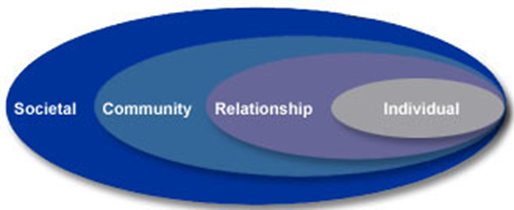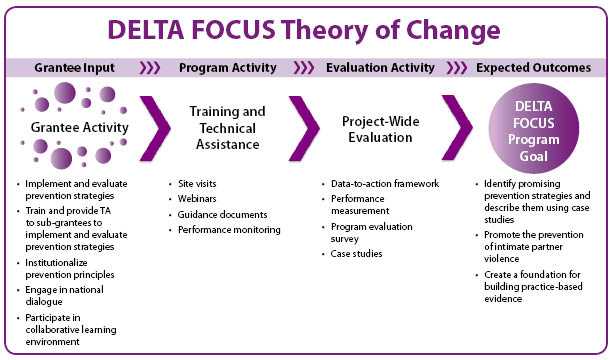The DELTA FOCUS Program: Intimate Partner Violence is Preventable
About the Program
DELTA FOCUS (Domestic Violence Prevention Enhancements and Leadership Through Alliances, Focusing on Outcomes for Communities United with States) is a five-year cooperative agreement funding 10 state domestic violence coalition grantees to engage in primary prevention of intimate partner violence (IPV). Primary prevention means stopping IPV before it occurs.
Use the map to access the website of CDC-funded state domestic violence coalitions.

Intimate partner violence is a serious, preventable public health problem that affects millions of Americans and results in serious consequences for victims, families, and communities.
- In an average minute, about 24 people are victims of rape, physical violence, or stalking by an intimate partner.1
- In 2010, 241 males and 1095 females were murdered by an intimate partner.2
- In one year, more than 12 million women and men reported being a victim of rape, physical violence, or stalking by an intimate partner.1
- In their lifetime, 1 in 4 women (24.3%) and 1 in 7 men (13.8%) report experiencing severe physical violence (e.g., hit with a fist or something hard, beaten, slammed against something) by an intimate partner.1
For additional information on why IPV is an important public health issue, see our Web page.
The DELTA FOCUS Program
DELTA FOCUS grantees support IPV prevention at the national, state and local levels through strategies that address the structural determinants of health at the outer layers (societal and community) of the social-ecological model. This means, in addition to addressing individual and relationship factors associated with IPV outcomes, grantees support work to change the environments and conditions in which people live, work and play. To do this, economic and social policies and processes and norms that shape the health of individuals and communities must be addressed. This may involve strategies that integrate issues related to education, employment, reducing gender bias, and more.
Each grantee supports one or two coordinated community response teams (CCRs) to implement strategies at the local level. CCRs are local coalitions comprised of members from a variety of sectors engaged in intimate partner violence prevention. Eighteen CCRs are supported by DELTA FOCUS. The project period of DELTA FOCUS is March 2013 to February 2018.
Goals of Current Strategies to Prevent Intimate Partner Violence (IPV)
Strategies that prevent IPV should ultimately:
- Reduce the occurrence of IPV through the promotion of healthy, respectful, nonviolent relationships
- Reduce known risk factors for IPV and promote protective factors
- Address all levels of the social ecology
Common strategies used in the field to prevent intimate partner violence include:
- Promoting healthy relationships and communication skills
- Engaging men and boys in violence prevention
- Developing youth assets and leaders
- Encouraging bystander intervention
- Changing gender and violence social norms
- Informing policy and systems change
- Building coalitions
- Mobilizing communities
Anticipated Outcomes
At the end of the five-year program, anticipated outcomes for DELTA FOCUS are:
- Changes in programs, processes, structures and other social determinants of health at state and local levels that have the potential to impact intimate partner violence
- Increases in protective factors and reductions in risk factors for intimate partner violence
- Establishment of a program evaluation database on violence prevention strategies that will contribute to the evidence base for IPV prevention at the societal and community levels of the social ecology
Program Concepts
-
Primary Prevention: Approaches that take place before intimate partner violence has occurred. Prevention strategies are guided by a set of principles including:
- Preventing first-time perpetration and first-time victimization
- Reducing risk factors associated with IPV
- Promoting protective factors that reduce the likelihood of IPV
- Implementing evidence-supported strategies that incorporate behavior change and social change theories
- Evaluating prevention strategies
- Using results to inform future plans
- Social-Ecological Model: A four-level model that considers the complex interplay between individual, relationship, community, and societal factors and allows us to address the factors that put people at risk for perpetrating or experiencing violence. Learn more about the social-ecological model.

- Social Norms Change: Changes to the informal, shared beliefs and standards of behavior within a community with regard to violence and relationships.
- Social Determinants of Health: The conditions in which people are born, grow, live, work and age that influence their opportunities for a healthy, productive life. These circumstances are shaped by access to money, power and resources at global, national and local levels. The social determinants of health contribute to health inequities – the unfair and avoidable differences in health status seen within and between countries.
- Structural Determinants of Health: The economic and social policies, processes and norms that structure opportunities for the health of individuals, communities, and jurisdictions; they include but are not limited to equitable access to quality early childhood development opportunities, education, employment/jobs with livable wages, food security, health services, housing, safe neighborhoods, and social inclusion.
Empowerment Evaluation: "Empowerment evaluation places an explicit emphasis on building the evaluation capacity of individuals and organizations so that evaluation is integrated into the organization’s day-to-day management processes… Empowerment evaluators coach individuals and organizations through an evaluation of their own strategies by providing them with the knowledge, skills, and resources they need to conduct just such an evaluation."3
History
 In 2002, authorized by the Family Violence Prevention Services Act (FVPSA), CDC developed the Domestic Violence Prevention Enhancements and Leadership Through Alliances (DELTA) Program to focus on primary prevention of IPV. For the next ten years, DELTA funded state domestic violence coalitions (SDVCs) to engage in statewide primary prevention efforts and to provide training, technical assistance, and financial support to local communities for primary prevention efforts.
In 2002, authorized by the Family Violence Prevention Services Act (FVPSA), CDC developed the Domestic Violence Prevention Enhancements and Leadership Through Alliances (DELTA) Program to focus on primary prevention of IPV. For the next ten years, DELTA funded state domestic violence coalitions (SDVCs) to engage in statewide primary prevention efforts and to provide training, technical assistance, and financial support to local communities for primary prevention efforts.
DELTA (2002-2013) built capacity for IPV primary prevention in 14 funded state domestic violence coalitions, their local CCRs and at the state level. Stakeholders were identified and partnerships were built that did not exist prior to DELTA. Empowerment evaluation was used to assess capacity-building efforts and programmatic activities.
During the latter years of DELTA, another project was implemented: DELTA PREP. DELTA PREP (Preparing and Raising Expectations for Prevention) was funded from 2008-2011 by the Robert Wood Johnson Foundation in collaboration with the CDC and the CDC Foundation. The DELTA PREP project provided an additional 19 SDVCs with training, technical assistance and a small amount of funding to incorporate primary prevention into their organizational, local and state IPV efforts.
DELTA and DELTA PREP offered many lessons learned, including the importance of capacity building at local, state, and organizational levels; the importance of ongoing program evaluation and continuous quality improvement; the importance of working at all levels of the social ecology; and the importance of concentrating resources (saturation) for greater impact.
The new DELTA FOCUS Program builds on DELTA's history by providing focused funding to states and communities for intensive implementation and evaluation of IPV primary prevention strategies that address the social and structural determinants of health at the societal and community levels of the social-ecological model (SEM).
While DELTA FOCUS grows from and builds on DELTA and DELTA PREP, it differs in the following key ways:
- 10 grantees
- Greater emphasis on implementation of prevention strategies, and less on initial capacity building (the project works with grantees who are already at high capacity)
- Increased focus on program evaluation to help build practice-based evidence
- Substantially increased implementation supports
- Reformulation of local partner groups
The new direction is intended to focus limited resources for maximum impact, building upon previous efforts and highlighting the project's success and contributions to the field.
For more information on the history of the DELTA program, visit our Web page.
National Engagement
CDC is working with the Family Violence Prevention and Services office of the Administration for Children and Families and the National Resource Center on Domestic Violence to foster leadership and support for primary prevention throughout the domestic violence prevention field. This includes any and all state, territorial, and tribal domestic violence coalitions (STTDVCs); local programs; national organizations; and allied partners interested in advancing intimate partner violence prevention. Some key activities related to this goal include:
- Providing support and technical assistance (TA) to the IPV Prevention Council in its development of a primary prevention agenda and implementation plan
- Developing a Prevention Focus Area on the Domestic Violence Evidence Project website
- Facilitating the development and dissemination of materials that tell the story of current and former IPV prevention initiatives and that promote emerging best practices, tools, and resources
- Linking STTDVCs, local programs, national partners and other allies interested in advancing a national prevention agenda through the development and/or maintenance of an effective and inclusive online community of practice.
Evaluation and Resources
 Program Evaluation
Program Evaluation
Program evaluation is an essential activity for the DELTA FOCUS program at both the national and grantee levels. There are four basic evaluation expectations for the DELTA FOCUS program.
- Describe the program
- Understand and plan the evaluation
- Document what happened
- Improve the program
Empowerment evaluators for each grantee support grantees in meeting the program evaluation expectations. CDC staff have the same expectations for the project-wide evaluation of the program.
Describe the Program
Through grantees' implementation of the DELTA FOCUS Program, intensive training and technical assistance support, and regular documentation and evaluation, the DELTA FOCUS program will achieve its program goals.
DELTA FOCUS Theory of Change

Text version of chart (content is revealed on activation):
DELTA FOCUS Theory of Change Grantee Input: Grantee Activity
- Implement and evaluate prevention strategies
- Train and provide TA to sub-grantees to implement and evaluate prevention strategies
- Institutionalize prevention principles
- Engage in national dialogue
- Participate in collaborative learning environment
Program Activity: Training and Technical Assistance
- Site visits
- Webinars
- Guidance documents
- Performance monitoring
Evaluation Activity: Project-Wide Evaluation
- Data-to-action framework
- Performance measurement
- Program evaluation survey
- Case studies
Expected Outcomes: DELTA FOCUS Program Goal
- Identify promising prevention strategies and describe them using case studies
- Promote the prevention of intimate partner violence
- Create a foundation for building practice-based evidence
Understand and Plan the Evaluation
The DELTA FOCUS program will include an assessment of program performance that covers ongoing monitoring and reporting (performance measurement), examining how the program is being implemented (program evaluation), and seeking to inform program improvements (data-to-action).
Document What Happened and Improve the Program
The performance measurement and program evaluation will support the documentation of what is happening through the project, and the data-to-action process will support continuous quality improvement of the DELTA FOCUS program.
-
Alaska Network on Domestic Violence and Sexual Assault
Project Coordinator
Claudia Plesa
130 Seward Street, Suite 214
Juneau, AK 99801
(907) 586-6566
cplesa@andvsa.org
-
California Partnership to End Domestic Violence
Project Coordinator
Sarah Foley
P.O. Box 1798
Sacramento, CA 95812-1798
(800) 524-4765
sarah@cpedv.org
-
Delaware Coalition Against Domestic Violence
Project Coordinator
Noel Duckworth
100 W. 10th Street, Suite 903
Wilmington DE 19801
(302) 658-2958
thrive@dcadv.org
-
Florida Coalition Against Domestic Violence
Project Coordinator
Kristen Pavlik
425 Office Plaza Drive
Tallahassee, FL 32301
(850) 325-3705
pavlik_kristen@fcadv.org
-
Idaho Coalition Against Sexual and Domestic Violence
Project Coordinator
Kimberly Matulonis
300 E. Mallard Drive, Suite 130
Boise, Idaho 83706
(208) 384-0419 ext. 307
info@engagingvoices.org
-
Indiana Coalition Against Domestic Violence
Project Coordinator
Colleen Yeakle
1915 W. 18th Street, Suite B
Indianapolis, IN 46202
(317) 917-3685
cyeakle@icadvinc.org
-
Michigan Coalition to End Domestic and Sexual Violence
Project Coordinator
Lisa Winchell-Caldwell
3893 Okemos Road, Suite B2
Okemos, MI 48864-4209
(517) 347-7000 ext. 38
Lisa.Winchell-Caldwell@mcedsv.org
-
North Carolina Coalition Against Domestic Violence
Project Coordinator
Carolina Alzuru
123 W. Main Street, Suite 700
Durham, NC 27701
(919) 956-9124
calzuru@nccadv.org
-
Ohio Domestic Violence Network
Project Coordinator
Rebecca Cline
4807 Evanswood Drive, Suite 201
Columbus, Ohio 43229
(614) 781-9651
RClineODVN@aol.com
-
Rhode Island Coalition Against Domestic Violence
Project Coordinator
Lucy Rios
422 Post Road
Warwick, RI 02888
(401) 467-9940
Lucy@ricadv.org
-
Alaska Network on Domestic Violence and Sexual Assault
Project Coordinator
Claudia Plesa
130 Seward Street, Suite 214
Juneau, AK 99801
(907) 586-6566
cplesa@andvsa.org -
California Partnership to End Domestic Violence
Project Coordinator
Sarah Foley
P.O. Box 1798
Sacramento, CA 95812-1798
(800) 524-4765
sarah@cpedv.org -
Delaware Coalition Against Domestic Violence
Project Coordinator
Noel Duckworth
100 W. 10th Street, Suite 903
Wilmington DE 19801
(302) 658-2958
thrive@dcadv.org -
Florida Coalition Against Domestic Violence
Project Coordinator
Kristen Pavlik
425 Office Plaza Drive
Tallahassee, FL 32301
(850) 325-3705
pavlik_kristen@fcadv.org -
Idaho Coalition Against Sexual and Domestic Violence
Project Coordinator
Kimberly Matulonis
300 E. Mallard Drive, Suite 130
Boise, Idaho 83706
(208) 384-0419 ext. 307
info@engagingvoices.org
-
Indiana Coalition Against Domestic Violence
Project Coordinator
Colleen Yeakle
1915 W. 18th Street, Suite B
Indianapolis, IN 46202
(317) 917-3685
cyeakle@icadvinc.org -
Michigan Coalition to End Domestic and Sexual Violence
Project Coordinator
Lisa Winchell-Caldwell
3893 Okemos Road, Suite B2
Okemos, MI 48864-4209
(517) 347-7000 ext. 38
Lisa.Winchell-Caldwell@mcedsv.org -
North Carolina Coalition Against Domestic Violence
Project Coordinator
Carolina Alzuru
123 W. Main Street, Suite 700
Durham, NC 27701
(919) 956-9124
calzuru@nccadv.org -
Ohio Domestic Violence Network
Project Coordinator
Rebecca Cline
4807 Evanswood Drive, Suite 201
Columbus, Ohio 43229
(614) 781-9651
RClineODVN@aol.com -
Rhode Island Coalition Against Domestic Violence
Project Coordinator
Lucy Rios
422 Post Road
Warwick, RI 02888
(401) 467-9940
Lucy@ricadv.org
References
-
- Black MC, Basile KC, Breiding MJ, Smith SG, Walters ML, Merrick MT, Chen J, Stevens MR. (2011). The National Intimate Partner and Sexual Violence Survey (NISVS): 2010 Summary Report. Atlanta, GA: National Center for Injury Prevention and Control, Centers for Disease Control and Prevention.
- United States Department of Justice. (2011). Crime in the United States, 2010. Washington, DC: Federal Bureau of Investigation, Uniform Crime Reports.
- Cox PJ, Keener D, Woodard T, Wandersman A. (2009). Evaluation for Improvement: A Seven Step Empowerment Evaluation Approach for Violence Prevention Organizations. Atlanta, GA: Centers for Disease Control and Prevention). Available at http://www.cdc.gov/violenceprevention/pdf/evaluation_improvement-a.pdf.


 ShareCompartir
ShareCompartir
